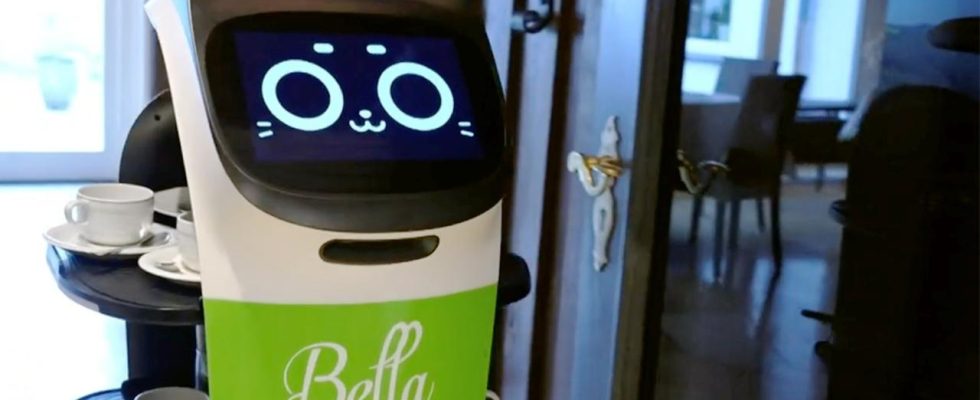There is a shortage of workers in hotels and restaurants. A hotel operator in Sauerland has purchased two robots to serve guests. The “real” employees feel relieved.
The hotel guests Erika and Reinhard Pusch don’t initially know exactly who is standing across from them at their table. She smiles friendly at a child-like face. It’s Lotte, a service robot, who clears the dishes. “When we saw him for the first time, when he was running through the rooms, we were shocked at first. But he’s doing it great, he knows where he has to go,” says Reinhard Pusch.
Two robots are currently in use in the hotel in Sauerland. Bella and Lotte usually transport dishes. They help with clearing or serving. They can load up to 40 kilograms, distribute them to the tables and bring them back to the kitchen. The programming only took one day, says hotelier Josef Nieder.
Robots for back problems
This is well received by the employees. “For us, a plate weighs 950 to 1,050 grams, plus 300 grams of food. Then you end up with more than 1.5 kilograms per plate. If our employees then carry three to four plates over 35 meters, they all have back problems,” says Low.
There are now some companies that successfully use robots. However, the German Hotel and Restaurant Association DEHOGA has not yet seen a general industry trend. “Today, more than ever, it is important in the hospitality industry to work efficiently, use resources sensibly and optimize processes. However, robots currently require a fairly high investment, which is by no means worthwhile for all companies,” says Sandra Warden, labor market expert and managing director of the DEHOGA federal association.
The two robot waiters are ready and waiting to be deployed.
Take work away, not replace it
It is important that robots can relieve employees of certain tasks, but should not replace them. Robots do work, but they are not a replacement for human contact. Erika Pusch is skeptical: “If this is the way that we are only served by robots, I don’t think that’s so nice. The human aspect should still be in the foreground.”
Josef Nieder tries to reassure them: “We actually have more time now because we don’t have to walk so much. This actually makes communication with the guests even better,” is his assessment after the first missions of his robots. He wants to use the robots to counteract the shortage of skilled workers that he, like many other companies, is struggling with. “Because we have a staff shortage and because we need help, I see this as a great idea and a huge help for the future. Groaning is of no use, we have to serve our guests,” said the hotelier.
Work steps will become more complex
The catering industry is particularly labor-intensive, and demographic change means that securing skilled workers and workers will remain a long-term challenge, according to DEHOGA. “Companies are making enormous efforts to attract, qualify and retain employees and to further optimize operational and work processes. These days, of course, this also includes digitalization and automation,” says Sandra Warden. Robots are part of this development. They could facilitate and accelerate processes and relieve employees of routine tasks.
Robots can be used in the kitchen or in service. Cooking robots are currently being considered for comparatively simple, standardized dishes such as pasta or curries, where the main task is to assemble and heat them. The DEHOGA Federal Association assumes that the work steps that can be carried out by robots will become more complex in the future.
17,000 euros per robot
Josef Nieder invested around 17,000 euros per robot. He is happy about this investment. “You quickly get used to it because it saves a huge amount of work. I couldn’t have imagined it myself three months ago. But then we saw it with a colleague who was really excited about it,” says Nieder. Now he even wants to invest in more robots. The terrace should be re-paved so that the robots can move there too.
Nieder also wants to rely on robots for room cleaning. However, these then have male names: Günther, Calli and Willi are supposed to help the mainly female cleaning staff.

